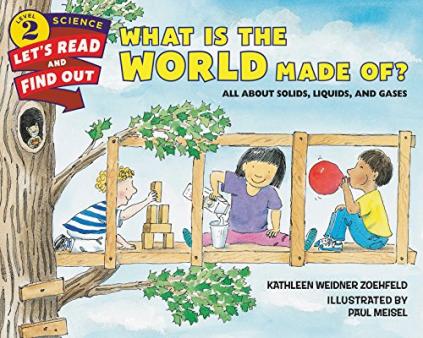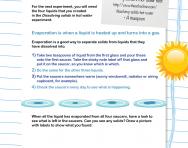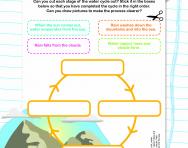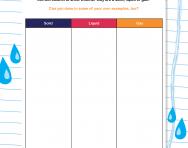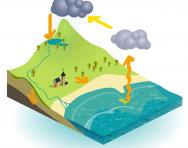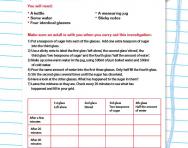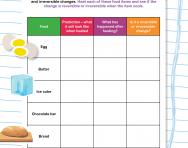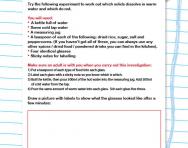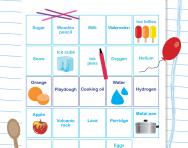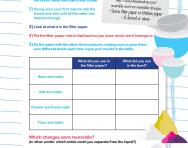What are states of matter?
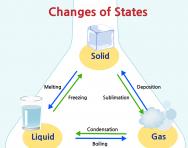
What is matter? What are states of matter?
Matter makes up our planet and the whole universe. On Earth, all matter exists in one of three main states: solid, liquid or gas.
A solid can hold its shape (for example, water in solid form is ice).
A liquid like water forms a pool: it flows or runs but it can't be stretched or squeezed.
A gas can flow, expand and be squeezed; if it is in an unsealed container it escapes (water in gas form is steam).
Depending on its temperature, matter can change state; heating, cooling, evaporating and condensation are ways in which a material changes state.
The diagram below shows that:
- Melting is the process of changing a solid into a liquid.
- Evaporation is the process of changing a liquid into a gas.
- Condensation is the process of changing a gas into a liquid.
- Freezing is the process of changing a liquid into a solid.
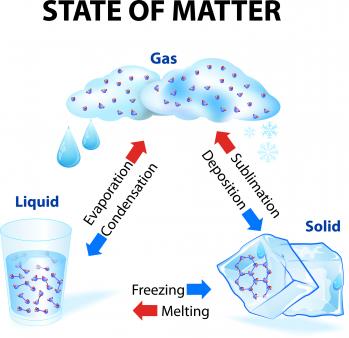
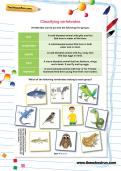
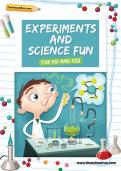
Download fantastic science resources today!
- Experiments And Science Fun pack
- All the instructions, questions and information you need
- PLUS 100s of science worksheets by school year
What do children learn about states of matter in primary school?
In KS2 children learn about types of solids, liquids and gases, how temperature and pressure affect substances in different states and how matter changes state.
A reversible change is a change that can be changed back again. For example, if an ice-cube is melted it becomes water but we can freeze it again to become an ice-cube so it can return to its original state. Melting and heating are examples of reversible changes.
An irreversible change is a change that cannot be changed back again. For example, if a cake mixture is baked it becomes a cake and we cannot turn it back into a mixture. The change is irreversible because a chemical reaction has taken place. Burning or mixing a liquid with bicarbonate of soda are examples of irreversible changes.
They also learn that:
- Filtering and sieving are methods of separating mixtures of solids and liquids.
- Dissolving is a way of mixing a solid and a liquid. When a solid dissolves in a liquid it creates a solution, for example when sugar dissolves in water.
When are children taught about states of matter in primary school?
In Year 4 children will learn:
- To group or sort materials into solids, liquids and gases
- To observe that some materials change state when heated or cooled
- To understand and use the terms evaporation and condensation
- To describe solids, liquids and gases
In Year 5 children will learn:
- That some changes are irreversible
- That some materials dissolve in liquids to make a solution
- To investigate how solutions can be separated using filtering and sieving
- To identify some reversible and irreversible changes
How are children taught about states of matter in the classroom?
Children may sort materials or pictures of materials into solids, liquids and gases.
They may also carry out some practical investigations:
- Children may explore reversible changes such as heating and cooling by making chocolate crispy cakes or ice-lollies
- Children may explore irreversible changes by making a bicarbonate of soda volcano, baking cakes or making toast
- Children will investigate how to separate solutions using sieving and filtering
States-of-matter activities for at-home learning:
- Melt chocolate and butter to make chocolate crispy cakes
- Make ice-cubes or ice-lollies or home-made ice-cream
- Make a cake or bake bread to observe the irreversible change
- Observe how clothes dry on the line in the sun.
- Mix bicarbonate of soda with vinegar to observe what happens
- Use sieves and filter paper (or kitchen roll) to separate solutions of sugar and water, salt and water or soil and water.

Give your child a headstart
- FREE articles & expert information
- FREE resources & activities
- FREE homework help





